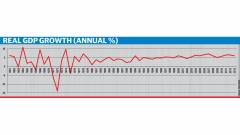UK-based PwC warns political instability, natural disasters to act as headwinds
Bangladesh is projected to become 23rd biggest economy in the world in next 35 years, joining for the first time a list of newly emerging and established emerging economies, said a study.
The country, now in 31st in the ranking, is seen to move up to 29th by 2030 and could grow at an average annual rate of over 5%.
Gross domestic product at purchasing power parity (PPP) terms is expected to stand at $1,291bn by 2030 and $3,367bn by 2050 from $536bn now.
However, in order to realise this, Bangladesh needs to tackle the adverse shocks such as political revolutions and natural disasters, said the study of PwC, a UK-based global consulting firm.
According to it, Bangladesh is among eight newly emerging economies to be included in the latest update of its “World in 2050” report for indicating signs of sustained rapid growth in the long term.
The other new entrants are the Philippines, Colombia, Egypt, Iran, the Netherlands, Pakistan and Thailand.
The top ten fastest growing economies are all developing countries: seven are from South and Southeast Asia and three are from Africa, according to the latest PwC update entitled “The World in 2050: Will the Shift in Global Economic Power Continue?”
The report, with a release date of last month 2015, presents the long-term projections of potential GDP growth up to 2050 for 32 of the largest economies in the world, covering 84% of total global GDP.
“We project the world economy to grow at an average of just over 3% per year in the period 2014-50, doubling the size by 2037 and nearly tripling by 2050,” it said.
The global economic power shift away from the established advanced economies in North America, Western Europe, and Japan will continue over the next 35 years despite a projected slowdown in Chinese growth after around 2020, it added.
China will clearly become the largest economy by 2030, dislodging the United States, while India could challenge the US for second place by 2050. Indonesia, Mexico, and Nigeria could push the United Kingdom and France out of top 10.
In fact, in global GDP ranking in PPP terms, China has already overtaken the US in 2014, the report said.
Indonesia, together with Vietnam, is regarded as a fast-rising economy in the global GDP rankings in the long term, reflecting relatively high projected average growth rates of around 4.5% to 5.5% per annum over the period.
Of the other countries in Southeast Asia mentioned in the report, Indonesia, currently in ninth place, is forecast to move up to fifth by 2030 and fourth by 2050 “if it can sustain growth-friendly policies,” said the report.
Thailand, occupying number 21 in the ranking, is seen to stay in place in both 2030 and 2050.
Malaysia, at number 27, is seen to climb to 24th in 2030 and remain there until 2050. It is projected to grow at around 4% per annum on average in the period to 2050, “an impressive performance for what is already a middle income country.”
Vietnam is predicted to move up from number 32 to number 28 then number 22.
These projections assume, however, that emerging markets will follow broadly growth-friendly policies, said the report. “In practice, not all may do so and therefore, not all of these economies will fulfill the potential indicated by the PwC growth projections, although some could also exceed the projections if they can accelerate their investment rates and institutional reforms.”
Source: Dhaka Tribune











The overall prediction of the world economy does commensurate with others view working in evonomic analytical field. The ranking of the 3rd world countries appears encouraging, but the positioning of them in the order mentioned need more clarification.
With the comment above, will it be possible to justify or put forward the indicator, as to on what basis and how did you came to this concluding remarks. Will be obliged if you send the total paper n a write up supporting your stand points on the comments above.
Regards, Brig Gen Halim ( Retired)